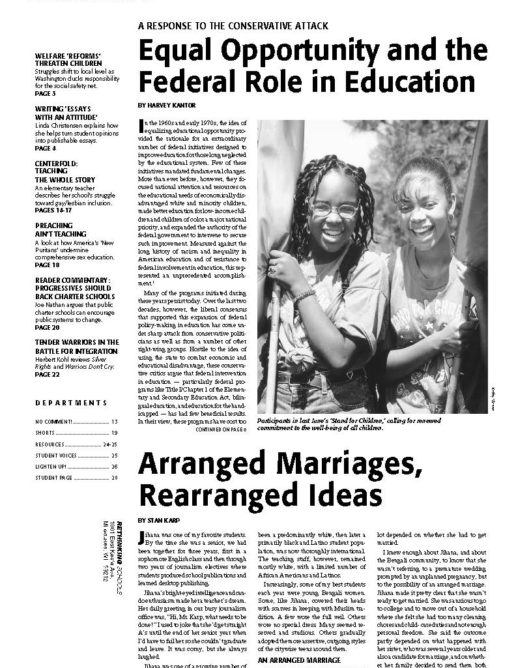Equity, Not Abandonment, Should Drive Federal Policy
In response to the freedom movement of the 1960s, the federal government made an unprecedented effort to equalize educational opportunity. It created a variety of programs that targeted those who had been least well-served by American schools and society. At one time these programs accounted for nearly 10% of all spending on education, but conservatives have succeeded in reducing that amount to approximately 6%.
Conservatives continue to attack many of these programs for being too expensive and for producing no lasting results. In the article that begins on p. 1, however, Harvey Kantor argues that federal educational programs have produced meaningful results despite a level of funding that falls far short of equalizing educational opportunity.
Kantor points out that federal educational programs of the 1960s and 1970s, despite their limitations, “represented an unprecedented accomplishment” when measured against the long history of racism and inequality in American education. We encourage you to read Kantor’s article and hope his overview of the federal role in education will spark further discussion on this vitally important topic.
Although there have been shortcomings in federal educational programs, they have comprised one of the few systematic efforts to explicitly target inequality. Without the federal government, whether at the judicial, executive or legislative branch, African Americans might still be legally prohibited from attending integrated schools, young girls might still be kept from quality sports programs, immigrant students might still be punished for using their native language in school, and children with disabilities might still be shunted off into inadequate facilities if allowed to go to school at all.
Democrats currently are holding off Republican efforts to further weaken the federal role in education. The future is not so certain, given growing bipartisan support to limit the extent to which government redirects resources to the poor. This emerging consensus undercuts the will to strenuously attack inequalities in schooling. It also has produced the bitter fruit of welfare “reform” that analysts predict will push 1 million more children into poverty (see Leon Lynn’s article in this issue).
As Kantor points out in his article, even more important to educational equity than an enhanced federal role in schools is its role in eliminating poverty. By this standard President Clinton can make no more legitimate claim to being “Education President” than could former President Bush.

